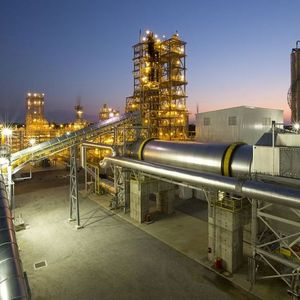KiOR achieves operational milestones at Miss. cellulosic refinery

Photo: KiOR Inc.
July 1, 2013
BY KiOR Inc.
KiOR Inc. announced July 1 that its commercial scale cellulosic gasoline and diesel production facility in Columbus, Miss., has achieved several key operational milestones.
First, the Columbus facility's Biomass Fluid Catalytic Cracking, or BFCC, unit has completed its first uninterrupted 30-day run. Second, the facility made its first shipment of cellulosic gasoline on June 28, which represented the first fuel shipment since March. Lastly, the facility commenced regular shipments of both gasoline and diesel that same day.
“Commencing regular shipments of gasoline and diesel is very significant for KiOR, as it reflects the continuous improvements in our operations at the Columbus facility,” said Fred Cannon, KiOR's president and CEO. “We have been undertaking considerable reliability and optimization efforts in areas of the facility unrelated to KiOR's core technology. The success of these efforts gives us confidence, more than ever, that the performance targets for the Columbus plant are attainable in the months ahead and that our operating assumptions for our next, larger Natchez plant are reasonable.”
“With the facility operating stably and producing cellulosic gasoline and diesel at commercial scale, we believe we are on track to achieve steady-state operations before the end of the calendar year and to
demonstrate improving performance metrics over that timeframe,” Cannon continued. “The largest commercially producing cellulosic production facility in the world, we expect Columbus—enhanced with our recent optimizations—to be the basis of our second facility's design at
Natchez.”
KiOR has developed a unique proprietary technology platform to convert abundant and sustainable nonfood biomass into fuels for use in vehicles on the road today. KiOR's cellulosic fuels, which may be
transported using existing distribution networks, help ease dependence on foreign oil, reduce lifecycle greenhouse gas emissions and create high-quality jobs and economic benefit across rural communities.
Advertisement
Advertisement
Advertisement
Advertisement
Related Stories
Calumet Inc. on Aug. 8 confirmed its Montana Renewables biorefinery is currently running at full capacity. An initial phase of the company’s MaxSAF initiative remains on track to boost SAF capacity to up to 150 MMgy by mid-2026.
Marathon Petroleum Corp. on Aug. 5 released second quarter financial results, reporting improved EBITDA for its renewable diesel segment. The company primarily attributed the improvement to increased utilization and higher margins.
Chevron Corp. on Aug. 1 confirmed the company started production at the Geismar renewable diesel plant in Louisiana during the second quarter after completing work to expand plant capacity from 7,000 to 22,000 barrels per day.
The public comment period on the U.S. EPA’s proposed rule to set 2026 and 2027 RFS RVOs and revise RFS regulations closed Aug. 8. Biofuel groups have largely expressed support for the proposal but also outlined several ways to improve the rulemaking.
In celebration of World Biodiesel Day, MOL Group on Aug. 8 announced SAF was successfully produced for the first time at INA’s Rijeka Refinery during a pilot project to process biocomponent. Renewable diesel was also produced.
Upcoming Events










